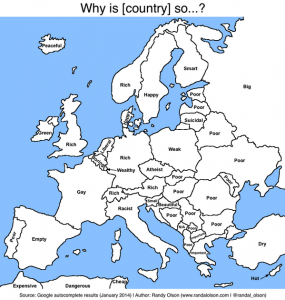Jan 29 2014
Post-Communist Legacy of Poverty
This article from The Atlantic reminded me of the GDP statistics listed among our primary sources. It seems notable that the Czech Republic, Poland, Croatia, Slovenia, and Macedonia have different results from the rest of the areas in the area of our concern. Also, East Germany is now part of the “rich” Germany, however East Germany shows results of “poor” (consistent with the pattern) followed by “so racist” in a separate search. Would these search results have been the same in the late 1990’s and up to the crisis of 2008?
UPDATE: The recession of the 1980’s does seem to have had caused disruption to the fragile Eastern European economies. The persistently lower GDP threshold must have also played a role in intensifying the discontent during such a recession. However, there is some variation within the Eastern Bloc; according to these GDP figures, the Czechoslovak and Hungarian economies did not take such a hard hit as Yugoslavia, and recovered more quickly than Poland. Perhaps the Polish case provides a reason for the acceleration of the collapse of the regime in Poland, which preceded the revolutions in Berlin, Prague and Sofia, the bloody coup in Bucharest, as well as the somewhat less dramatic transition in Hungary.
Comments Off on Post-Communist Legacy of Poverty
